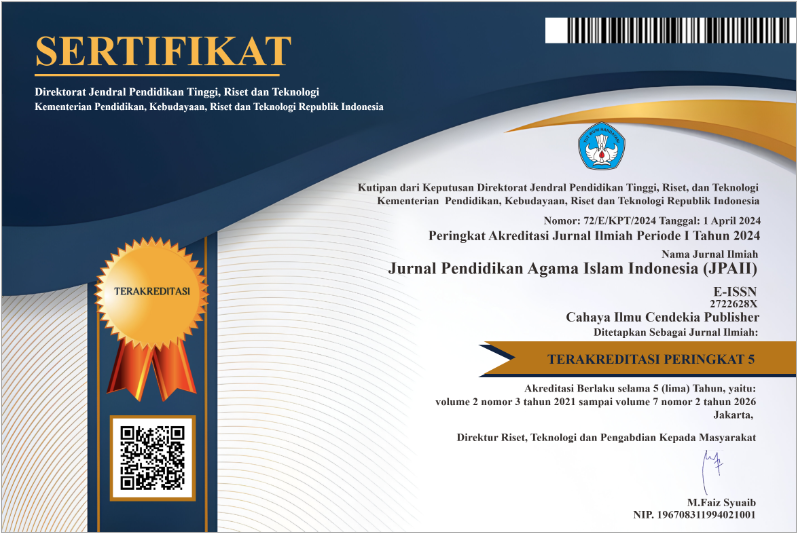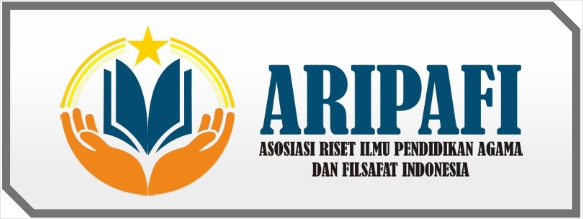Pengaruh Pelaksanaan Tugas Kepala Madrasah Terhadap Profesionalitas Guru Di MTs Negeri Model Kota Sorong
Abstract
Tujuan Penelitian: Tujuan penelitian ini adalah untuk mengetahui gambaran dari pengaruh pelaksanaan tugas Kepala Madrasah Tsanawiyah Negeri Model terhadap profesionalitas guru.
Metodologi: Penelitian ini menggunakan pendekatan kuantitatif, dengan jenis penelitian deskriptif. Subjek penelitian yang digunakan berjumlah 43 orang. Instrumen pengumpulan data yang digunakan adalah kuesioner. Teknik analisis data yang digunakan adalah uji regresi linear sederhana.
Temuan Utama: Temuan penelitian ini menunjukkan bahwa terdapat pengaruh antara pelaksanaan tugas kepala madrasah terhadap profesionalitas guru.
Keterbaruan/Keaslian dari Penelitian: Keterbaruan penelitian ini adalah menganalisis pengaruh pelaksaan tugas kepala madrasah terhadap profesionalitas guru di tingkat sekolah menengah pertama.
References
[2] F. Reichert, D. Lange, and L. Chow, “Educational beliefs matter for classroom instruction: A comparative analysis of teachers’ beliefs about the aims of civic education,” Teach. Teach. Educ, vol. 98, pp. 1–13, 2020, doi: 10.1016/j.tate.2020.103248.
[3] I. Irwanto, E. Rohaeti, and A. K. Prodjosantoso, “A Survey Analysis of Pre-Service Chemistry Teachers’ Critical Thinking Skills,” MIER Journal of Educational Studies, Trends & Practices, vol. 8, no. 1, pp. 57–73, 2018. doi: 10.52634/mier/2018/v8/i1/1423.
[4] A. Hofstein and R. Mamlok-Naaman, “High-school students’ attitudes toward and interest in learning chemistry,” Educacion Quimica, vol. 22, no. 2, pp. 90–102, 2011, doi: 10.1016/s0187-893x(18)30121-6.
[5] J. F. Hair, R. E. Anderson, R. L. Tatham, and W. C. Black, Multivariate Data Analysis, 7th ed. United Stated, Pearson Education Limited, 2019.
[6] M. Pressley and C. B. McCormick, Advanced educational psychology for educators, researchers, and policymakers. New York, USA: HarperCollins College Publishers, 1995.
[7] R. G. Brockett and R. Hiemstra, Self-direction in adult learning: Perspectives on theory, research, and practice. London and New York: Routledge, 2020.
[8] B. J. Zimmerman and A. R. Moylan, “Self-regulation: where metacognition and motivation intersect,” in D. J. Hacker, J. Dunlosky, and A. C. Graesser, Eds., Handbook of Metacognition in Education, 2009, pp. 299–315.
[9] G. Veruggio, “The EURON roboethics roadmap,” in Proc. Humanoids ’06: 6th IEEE-RAS Int. Conf. Humanoid Robots, 2006, pp. 612–617, doi: 10.1109/ICHR.2006.321337.
[10] J. Zhao, G. Sun, G. H. Loh, and Y. Xie, “Energy-efficient GPU design with reconfigurable in-package graphics memory,” in Proc. ACM/IEEE Int. Symp. Low Power Electron. Design (ISLPED), Jul. 2012, pp. 403–408, doi: 10.1145/2333660.2333752.
Copyright (c) 2022 Alfan Faiza Rahman

This work is licensed under a Creative Commons Attribution-NonCommercial 4.0 International License.
Authors who publish with this journal agree to the following terms:
- Authors retain copyright and acknowledge that the Jurnal Pendidikan Agama Islam Indonesia (JPAII) is the first publisher licensed under a Creative Commons Attribution 4.0 International License.
- Authors are able to enter into separate, additional contractual arrangements for the non-exclusive distribution of the journal's published version of the work (e.g., post it to an institutional repository or publish it in a book), with an acknowledgment of its initial publication in this journal.
- Authors are permitted and encouraged to post their work online (e.g., in institutional repositories or on their website) prior to and during the submission process, as it can lead to productive exchanges and earlier and greater citation of published work.






.png)
.png)





















